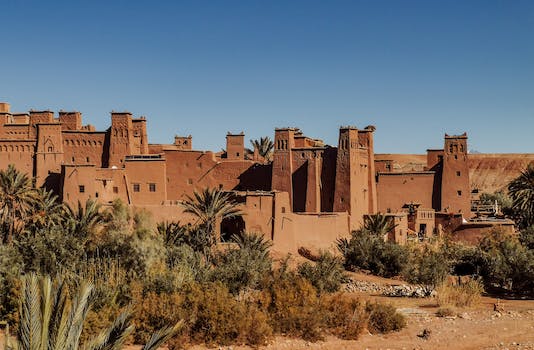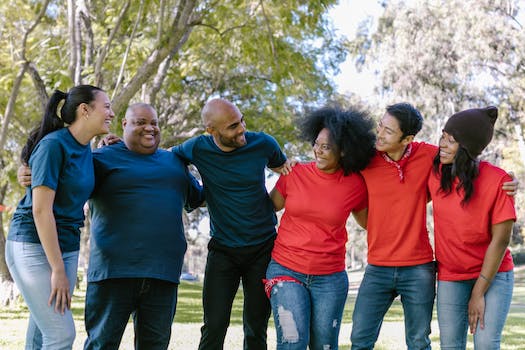Cultural ambassador programs play a crucial role in fostering global understanding. In an increasingly interconnected world, these programs serve as a bridge between different cultures, promoting mutual respect, appreciation, and dialogue. By bringing individuals from diverse backgrounds together, cultural ambassador programs provide an opportunity to exchange ideas, traditions, and values, ultimately breaking down barriers and fostering a more inclusive and harmonious global community. This article delves into the significance of such programs in promoting cross-cultural understanding and highlights their impact on enhancing intercultural communication.
- 1. Introduction
- 1.1. What are cultural ambassador programs?
- 1.2. Importance of cultural ambassador programs
- 1.3. Benefits of participating in cultural ambassador programs
- 1.4. Examples of cultural ambassador programs
- 1.5. How to become a cultural ambassador
- 2. Role and Responsibilities
- 2.1. Representing one’s own culture
- 2.2. Promoting cultural exchange and understanding
- 2.3. Organizing cultural events and activities
- 2.4. Facilitating language and cultural learning
- 2.5. Building international relationships
- 3. Impact and Influence
1. Introduction
Cultural Ambassador Programs play a crucial role in promoting global understanding. In today’s interconnected world, it has become increasingly important to bridge the gap between different cultures and foster mutual respect and appreciation. These programs provide a platform for individuals from diverse backgrounds to exchange ideas, share their cultural experiences, and build meaningful connections. By acting as cultural ambassadors, participants can break down stereotypes, challenge misconceptions, and promote a more inclusive and tolerant society. This article will explore the significance of Cultural Ambassador Programs in fostering cross-cultural dialogue and enhancing global cooperation.
1.1. What are cultural ambassador programs?
Cultural ambassador programs are initiatives that aim to promote global understanding and cultural exchange. These programs involve individuals, often students or professionals, who are selected to represent their country or organization abroad. The main objective of cultural ambassador programs is to foster mutual respect, tolerance, and appreciation for diverse cultures, traditions, and perspectives.
Participants in these programs serve as cultural emissaries, sharing their own culture while also learning about and immersing themselves in the host country’s culture. They act as bridges between different societies, breaking down stereotypes, and building connections based on shared values and interests.
Cultural ambassador programs can take various forms, including exchange programs, study abroad opportunities, artist residencies, language teaching programs, and international volunteer projects. These programs provide participants with the chance to engage with people from different backgrounds, develop cross-cultural communication skills, and gain a deeper understanding of global issues and perspectives.
By fostering cultural exchange and understanding, cultural ambassador programs play a crucial role in promoting peace, harmony, and cooperation among nations. They contribute to breaking down barriers and facilitating dialogue between different cultures, which is essential in a globalized world where intercultural competence is increasingly important.
In the following sections, we will explore the significance of cultural ambassador programs in various aspects of society and the benefits they bring to individuals, communities, and the world at large.
1.2. Importance of cultural ambassador programs
Cultural ambassador programs play a crucial role in promoting global understanding and fostering cultural exchange. These programs aim to bridge the gap between different cultures, allowing individuals to gain a deeper appreciation and respect for diverse traditions, customs, and beliefs. By facilitating meaningful interactions and dialogue, cultural ambassador programs help break down stereotypes and biases, fostering empathy and mutual understanding among people from different backgrounds. These programs also serve as a platform for sharing knowledge, ideas, and experiences, creating opportunities for collaboration and cooperation on a global scale. Through cultural ambassador programs, nations can showcase their unique heritage, art, and traditions, promoting cultural diversity and preserving the richness of human civilization. Ultimately, these programs contribute to building a more interconnected and harmonious world, where cultural differences are celebrated and valued.
1.3. Benefits of participating in cultural ambassador programs
Participating in cultural ambassador programs can offer numerous benefits to individuals, communities, and the world as a whole. These programs provide a platform for individuals to immerse themselves in different cultures, fostering mutual understanding and appreciation. By being a cultural ambassador, one can contribute to promoting global understanding in several ways. This article will explore the importance of cultural ambassador programs in bridging cultural gaps, promoting diversity, and enhancing international relations.
1.4. Examples of cultural ambassador programs
Cultural ambassador programs play a vital role in promoting global understanding by facilitating cultural exchange and fostering positive relationships between nations. These programs aim to bridge the gap between different cultures, allowing individuals to learn about and appreciate diverse perspectives, traditions, and customs. By sending ambassadors to various countries, cultural exchange and dialogue are encouraged, thereby promoting mutual respect and understanding. The following are some examples of cultural ambassador programs that have successfully contributed to enhancing global understanding:
1.5. How to become a cultural ambassador
In conclusion, you may save money without sacrificing quality with these 10 ideas for healthy meal preparation. Delicious, healthy, and inexpensive meals can be made with a little bit of preparation and some inexpensive items. Meal preparing is an excellent way to improve one’s health, as well as one’s finances and time. So, get started with these suggestions and set out on a delicious and inexpensive culinary adventure!
2. Role and Responsibilities
The value of cultural ambassador programs in fostering mutual understanding across nations cannot be overstated. These initiatives encourage interaction between people from different cultures by bridging geographical and linguistic barriers. A cultural ambassador’s duties include learning about the host culture while also sharing aspects of their own heritage with the locals. This calls for an in-depth familiarity with both cultures, as well as the aptitude for cross-cultural communication and connection building.
A cultural ambassador’s duties may change with each organization and event. They may be invited to host cultural events, lead seminars and discussions, deliver speeches, or instruct others in various facets of their own culture. They facilitate communication between groups of people from different backgrounds, which can break down barriers and increase mutual appreciation and knowledge.
Cultural ambassadors are also expected to serve as experts on their own culture, enlightening curious onlookers and fielding inquiries from the media. In addition, individuals may participate in language exchange programs to teach others their original tongue and pick up the local tongue at the same time. A more connected and inclusive society, where diversity is recognized and understanding is encouraged, can be achieved in part through individuals’ participation in cultural ambassador programs.
2.1. Representing one’s own culture
Being a cultural ambassador for one’s own culture is an important way to spread awareness and appreciation of other cultures around the world. The function of cultural ambassador programs in promoting understanding and friendship between people of diverse backgrounds is substantial.
One’s duty as a cultural ambassador is to promote one’s own culture in an honest and upbeat way. This includes disseminating culturally specific beliefs, norms, practices, and artistic expressions. Through their efforts, cultural ambassadors dispel myths and misconceptions about their heritage.
Furthermore, cultural ambassadors are tasked with making links and encouraging communication between diverse cultural groups. They promote mutual understanding between their home culture and the host country by mediating communication between the two.
Cultural representatives also have the duty to educate the public about the host country’s culture. They explain aspects of their heritage such as their language, food, and social mores. Cultural ambassadors help spread a greater respect for diversity in the world by teaching others about their own culture.
Being a cultural ambassador for one’s own country is both an honor and a heavy burden. To effectively communicate and convey the depth and originality of one’s culture, one needs to be fluent in English and excellent in writing. By educating people about other cultures and encouraging them to travel the world as cultural ambassadors, these programs help make the world a better place for everyone.
2.2. Promoting cultural exchange and understanding
The significance of cultural ambassador programs in increasing international understanding and communication is critical. These initiatives work on fostering an understanding and appreciation of one another’s cultures. Cultural ambassadors are those who represent one culture while learning about and participating in another. They bridge the gap between different cultures by encouraging communication and mutual respect.
There are many duties associated with becoming a cultural ambassador. First, they promote their own heritage and all it has to offer by teaching others about it. In order to promote their heritage, art, music, and food, they may hold cultural events, concerts, or exhibitions. In doing so, they help ensure that their traditions remain alive and flourish for future generations.
Second, cultural ambassadors make an effort to connect with locals and learn about their way of life. They facilitate communication between people of different backgrounds, which breaks down barriers and challenges prejudice. They contribute to lowering obstacles and increasing mutual understanding and respect through their conversations.
Ambassadors for cultural exchange also advocate for such programs and projects. They advocate encouraging members of their own culture to take part in exchange programs, broadening their exposure to and appreciation of other traditions. They also help foreign students, tourists, and new arrivals adjust to their new home by pointing them in the right direction and answering their questions.
Cultural ambassadors may also act as translators and interpreters. They help with the translation and transmission of cultural nuances, facilitating dialogue between people of diverse cultural backgrounds. This improves comprehension and reduces room for misunderstanding.
Global cultural awareness and interaction rely heavily on cultural ambassadors and the work they conduct. They help make the world a better, more accepting, and more interdependent place.
2.3. Organizing cultural events and activities
Promoting international understanding through cultural ambassador programs relies heavily on the organization of cultural events and activities. These gatherings play a vital role in encouraging people from different cultures to interact with one another and learn to value the richness of one another’s heritage.
Those in charge of coordinating such events have a wide range of duties to perform. To begin, they must determine which cultural activities and events would most effectively reach their intended audience and further their goals of fostering international understanding.
Once the events have been selected, planners will need to consult with residents, cultural institutions, and other interested parties to ensure a successful outcome. This entails reserving appropriate locations, acquiring mandatory licenses, and organizing supporting services including transportation, lodging, and equipment.
In addition, organizers must select and present a wide range of cultural activities, including as performances, exhibitions, workshops, and conferences. In order to provide participants with meaningful cultural experiences, they must work with artists, performers, scholars, and experts.
In addition, it is crucial for event planners to foster a warm and welcoming environment for all attendees. Events like these should promote audience engagement and debate across cultural boundaries. We can accomplish this by setting up Q&A sessions, networking events, and panel discussions.
Additionally, organizers have a significant role in encouraging cultural awareness and respect among all attendees. They need to make sure that the activities are constructed in a way that promotes inclusion, dispels preconceptions, and brings people together.
The final step for planners of cultural events and activities is to assess their results. The programs’ success in fostering cross-cultural understanding can be gauged by gathering participant comments, tracking levels of participation, and analyzing the results.
In conclusion, developing international understanding through cultural events and activities organized as part of cultural ambassador programs is crucial. Finding appropriate events, managing logistics, curating genuine experiences, designing welcoming spaces, encouraging cultural awareness, and measuring results are all part of an organizer’s remit. Successfully bridging cultural divides and encouraging global tolerance and acceptance is a primary goal of cultural ambassador programs.
2.4. Facilitating language and cultural learning
Cultural ambassador programs rely heavily on their ability to facilitate language and cultural acquisition. By bringing together people from all around the world, these initiatives serve a crucial role in fostering mutual understanding. Cultural ambassadors are tasked with bridging gaps in understanding and appreciation between groups of people from different backgrounds.
There is a wide range of duties assigned to cultural ambassadors. As a first order of business, they must coordinate and oversee language-learning initiatives. Through these initiatives, participants can interact with native speakers of target languages and improve their language skills. Participants improve their language abilities and their understanding of other cultures through conversation and language activities.
Cultural ambassadors facilitate both language learning and cross-cultural experiences. Through these events, attendees can get a taste of what it’s like to live like a local in another country. This experiential learning technique encourages people to be more empathetic and accepting of others from different backgrounds.
In addition, cultural ambassadors frequently take on the role of teacher or tour guide for students and visitors from other countries. They aid by being a sounding board and a guiding hand as foreigners learn to adapt to their new home. Help can be given with anything from the most basic tasks like arranging lodging and transportation to the more complex ones like learning the local customs and etiquette.
In addition, cultural ambassadors must plan and execute cultural activities and educational programs. The purpose of these gatherings is to celebrate the diversity of human culture and to foster understanding and respect between people of different backgrounds. Participants are exposed to various cultural expressions and get a better understanding of the values and beliefs of other groups through art exhibitions, musical performances, traditional dances, and participatory workshops.
In sum, cultural ambassador programs are extremely useful in expanding human understanding across borders. These initiatives help create a more peaceful and accepting world by encouraging people from all walks of life to learn a new language and experience a new culture by hosting international visitors.
2.5. Building international relationships
Relationship-building across national boundaries is essential for advancing intercultural communication and mutual understanding. When it comes to bridging cultural divides and fostering international understanding, cultural ambassador programs play a key role.
When interacting with people from other countries, Cultural Ambassadors are expected to uphold the values and traditions of their home country. They play an important role as cultural diplomats by representing their country favorably abroad and fostering mutual understanding amongst different cultures. A Cultural Ambassador should be well-versed in their own culture and have a solid grasp of the local customs and values.
Festivals, exhibitions, and performances are just some of the types of cultural events that Cultural Ambassadors help plan and take part in. These gatherings allow people from all walks of life to interact, expand their horizons, and develop a deeper appreciation for one another’s cultures. Workshops, presentations, and conversations on various parts of their culture are also often hosted by Cultural Ambassadors in collaboration with local groups, schools, and universities.
Cultural Ambassadors play an important role in attracting visitors and investors to their home nation, in addition to fostering cultural understanding. They tell people and businesses in the host country about the sights to see, business opportunities to take advantage of, and economic potential the country has. In their roles as cultural and corporate representatives, they help strengthen international ties and broaden awareness of other cultures.
In sum, cultural ambassador programs are useful resources for advancing international understanding and bonding people from different parts of the world together. Cultural Ambassadors are important because of the work they undertake in making the globe a more culturally conscious and connected place.
3. Impact and Influence
Programs that train individuals to behave as cultural ambassadors have a significant effect on increasing international understanding. These initiatives facilitate communication and understanding amongst people of various backgrounds. Cultural ambassador programs encourage understanding, acceptance, and tolerance by bringing people from different backgrounds together. They provide as a venue for people to become familiar with and respectful of different cultures. Those who participate in such courses gain a more nuanced comprehension of such global problems as poverty, inequality, and ecological threats. Programs that train individuals to act as cultural ambassadors can reduce prejudice and increase understanding between peoples of different backgrounds. They help create a more accepting and peaceful world by illuminating the many cultures that make up our shared humanity. In the end, these initiatives can foster new ways of thinking, increase communication, and strengthen ties across countries.
3.1. Enhancing global perspectives
By broadening people’s horizons and fostering effect and influence, cultural ambassador programs are crucial in advancing international understanding. These kind of events facilitate cross-cultural communication by bringing together people from diverse countries and backgrounds to learn from one another and discuss their shared humanity. As cultural ambassadors, people can learn about other cultures while also promoting their own, which can help dispel prejudice and foster mutual respect.
Cultural ambassador programs are effective because they expose participants to new cultures and ways of thinking. By fully experiencing another culture, program participants are able to better understand and appreciate the nuances that make it special. Through this experience, they gain a broader understanding of the world and learn to think more inclusively.
Individuals’ maturation and development are also greatly influenced by cultural ambassador programs. Participants gain cultural awareness, flexibility, and intercultural communication skills through interactions with people from different backgrounds. In today’s interconnected world, where worldwide collaboration and understanding are critical to tackling difficult global issues, these abilities are more valuable than ever.
Cultural ambassador programs not only help participants develop as individuals, but also benefit society as a whole. Upon their return to their home countries, cultural ambassadors share the insights and experiences they’ve gathered throughout their time abroad with their communities. With this information in hand, they may help others learn about the world’s many cultures, dispel common myths, and create a more accepting and welcoming society for all. Cultural ambassadors play an important role in making the world a more accepting and inclusive place by sharing their experiences and fostering mutual appreciation of different cultures.
In conclusion, cultural ambassador programs are extremely important because of the impact and influence they have in creating global understanding. People can broaden their horizons, challenge their preconceptions, and hone their intercultural competence through participation in such activities. People can be powerful agents of change by serving as cultural ambassadors and thereby contributing to a more accepting and peaceful world.
3.2. Breaking stereotypes and prejudices
Promoting global understanding through cultural ambassador programs relies heavily on dispelling misconceptions and biases. These initiatives seek to unite and embrace people of all backgrounds and cultures by bridging the gap between them.
Lack of familiarity with different cultures is a common root cause of prejudice and generalizations. By participating in cultural ambassador programs, people are given the opportunity to question and refine their own stereotypes and assumptions.
Cultural ambassador programs can dispel prejudice by giving participants firsthand exposure to and contact with people from a variety of cultures. Participants can dispel myths and cultivate empathy through face-to-face interaction by learning about the traditions, practices, and values of others firsthand.
These initiatives are also helpful in developing cross-cultural understanding and appreciation. Cultural ambassador programs foster open communication, teamwork, and the exchange of ideas by bringing people from diverse backgrounds together. The sharing of information like this fosters a more accepting and diversified global society by removing barriers between people.
Furthermore, by highlighting the talents, successes, and contributions of individuals from diverse cultures, cultural ambassador programs can combat entrenched stereotypes. These programs can assist to shatter misconceptions and build understanding and respect by highlighting the positive qualities of diverse cultures and showing their rich heritage.
In conclusion, reducing prejudice and skepticism around the world is impossible without cultural ambassador programs. These initiatives have the ability to build a more welcoming and inclusive world where diversity is acknowledged and respected by giving people opportunity to engage with diverse cultures.
3.3. Fostering cross-cultural collaboration
When people from different cultures work together, it can have a profound effect on improving communication and building mutual respect. People from many walks of life are able to interact with one another, share perspectives, and work together on a wide range of initiatives. Working together has several benefits, including increased understanding and appreciation of other cultures and a greater willingness to learn from one another’s experiences. People can develop more compassion and regard for one another as a result of working with those from different cultural backgrounds. Furthermore, this collaborative method helps reduce prejudice and bias by giving people a chance to interact with one another on a more intimate level and test their own assumptions. We can foster greater understanding, foster togetherness, and establish a more welcoming global society by actively seeking out opportunities for cross-cultural engagement.
3.4. Developing intercultural communication skills
Those who aspire to play a significant role in fostering international understanding must master the art of intercultural communication. In today’s globalized society, the ability to communicate and build relationships across cultural boundaries is crucial. Cultural ambassadors can promote mutual understanding and cooperation by honing these abilities.
Being able to communicate effectively across cultural boundaries requires an attitude of openness, empathy, and respect for other people’s perspectives and values. It calls for flexibility in one’s approach to communication and a curiosity for and openness to other cultures. Cultural ambassadors need these abilities so that they can effectively communicate their ideas and concepts and also grasp and interpret the viewpoints of others.
Cultural ambassadors can better avoid or resolve any disputes that may arise as a result of cultural differences if they are well-versed in intercultural communication. They can prevent misunderstandings and make deeper connections if they are culturally attuned. This is crucial in fostering mutual trust and respect among people of different cultural origins, which is essential for advancing international comprehension.
The success of cultural ambassador programs and their ability to foster international understanding hinges in large part on participants’ ability to effectively communicate across cultural boundaries. As a result of increased communication, cultural understanding, and cooperation, people are better able to make a beneficial difference in the world.
3.5. Creating a more inclusive and diverse society
In today’s worldwide world, it is more important than ever to work toward a more inclusive and diverse society. People from all walks of life may learn from one another and live in peace if we embrace and celebrate our many cultural differences. Programs that train people to act as cultural ambassadors are crucial to accomplishing these objectives. People from all over the world are brought together in these programs to learn from and teach each other about one another’s cultures. Participants get a richer knowledge of one another’s cultural norms, values, and beliefs through conversation and interaction across cultural boundaries.
Cultural ambassador programs have a significant and far-reaching effect. They do more than simply unite people of different backgrounds; they foster understanding, compassion, and acceptance as well. Participants broaden their horizons and become more accepting of differing perspectives as a result of their participation in meaningful conversations. They gain an understanding of the importance of culture and tradition and come to value differences. Insights like these help pave the way for a more accepting and equitable society in which everyone has a place.
Also, public opinion and policymaking benefit from cultural ambassador initiatives. Once back in their home countries, participants continue to spread the message of cross-cultural understanding and international cooperation. They talk about what they’ve been through and what they’ve learned, dispelling myths and proving people wrong. By disseminating this information, we can better influence public opinion and persuade decision-makers to put diversity and inclusion at the forefront of their agendas.
In conclusion, cultural ambassador programs are extremely useful in fostering intercultural communication and societal acceptance of differences. Participants obtain a more nuanced understanding of other cultures through these initiatives, which helps to promote understanding and tolerance. Beyond the individual, cultural interchange can have an effect on public opinion and policy, leading to a more peaceful and connected world.
Conclusion
In conclusion, programs that train people to act as cultural ambassadors are extremely useful in expanding people’s horizons and fostering peace around the world. These kind of activities encourage people from different backgrounds to learn from one another and celebrate their similarities. Cultural ambassador programs contribute to a more accepting and interconnected world by highlighting the uniqueness and beauty of the world’s many cultures. Ambassadors have an important role in promoting international understanding, tolerance, and friendship. In the grand scheme of things, these initiatives are vital for spreading solidarity and promoting peace around the world.





